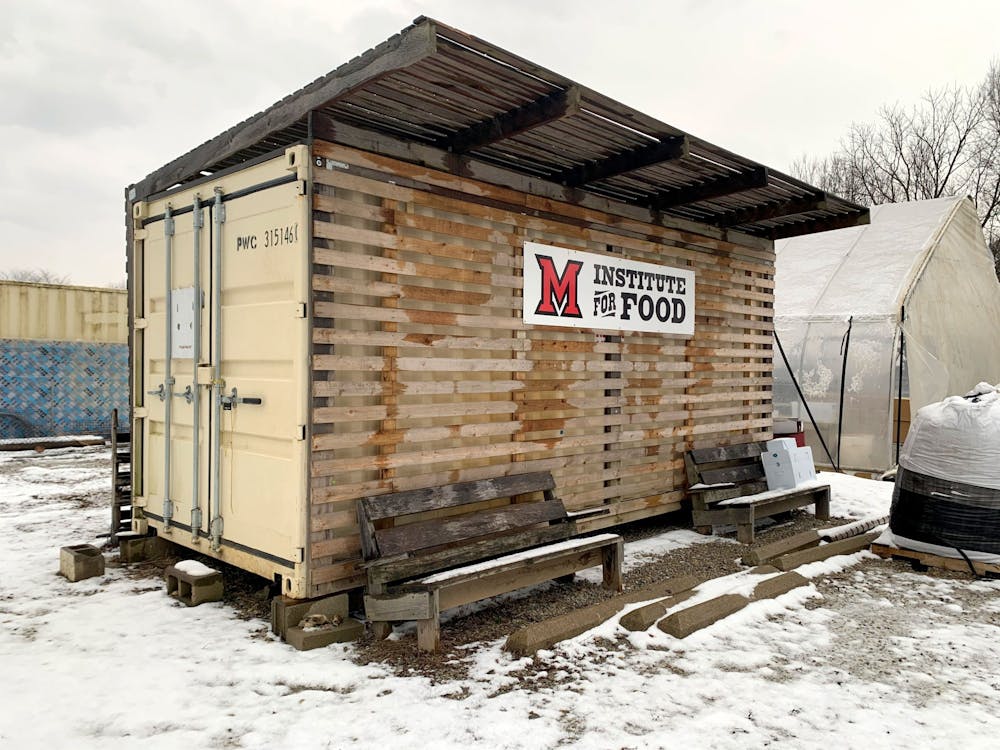Past a thin buffer of trees and down a short gravel path off Somerville Road sits a modest farm. Visible from the street, Miami University students, faculty and Oxford community members move among dozens of rows to lay seed on newly-thawed earth. It’s growing season in Oxford.
These 14 acres are home to the Institute for Food Farm at Miami (IFF farm). Spring growing season means lots of work for farmers. In just a few months, this land will be crawling with Miami student interns and volunteers to maintain the farm.
“It was a really awesome experience doing manual labor on the farm,” said Sarah Siegel, a former intern. “There’s always something to do, so any help is always appreciated.”
The IFF farm also provides sustainable crop production experience to IFF farm students and research opportunities for students in natural science programs.
Justin Fain, a former intern who is now a research specialist in the Miami’s Department of Geography, was approached to analyze the farm’s productivity as an undergraduate.
The next semester, he had some free time and set up an independent study to work on the farm.
Besides research, however, the farm has another purpose: to produce organic crops for Oxford residents. Through a Community Supported Agriculture (CSA) program, the farm sells its produce weekly to subscribers. Customers are given a pre-purchased amount of food; the type of vegetables, however, are determined by each harvest. Profit from the crop share packages, which can cost up to $635 per year, are used for upkeep and expansion of the program.
“Of course I got into the CSA because I wanted to eat the food that I had been growing with [the IFF farm],” Fain said regarding his time as an intern and, later, CSA subscriber. “It’s a shame to let [the vegetables] go to waste, so you end up eating all of them … You’re in a race against time within the next week. There was definitely a change to my diet.”
Although CSA subscribers often have to make dietary adjustments, they say that the program is affordable and offers the Miami community a more sustainable alternative to non-organic produce.
“If you are a student, or even a person who can cook and eat veggies throughout the week, this is hands-down the best, cheapest way to get incredibly local and high quality produce,” Siegel said.
One of the farm’s main focuses is sustainability. From solar irrigation to integrated pest management, the farm is dedicated to growing a diverse range of organic crops with green methods and without synthetic fertilizers or soil supplements.
“It’s great to support a local organization that is growing fresh, organic food for the Miami community,” Jason Barone, director of communications for the College of Arts and Science and CSA subscriber, wrote in an email to The Miami Student.
Enjoy what you're reading?
Signup for our newsletter
Many CSA subscribers are not students, but Miami faculty, staff and Oxford residents seeking fresh produce. Jayne Whitehead, assistant vice president of development and gift planning and first-year CSA subscriber, emphasized that CSA appeals to more people than sustainability-minded IFF and Institute for the Environment and Sustainability students.
“While I make an effort to be [environmentally] conscious, it’s not my major focus. I like to cook, so it’s more important to me to have better quality, fresher things,” she said. “If the sustainability piece comes along with it, that’s desirable. [Sustainability] is a secondary goal, a bonus.”
To student CSA subscribers, however, the simplicity of the program is appealing.
“I do think it’s an incredible opportunity for students, and honestly community members, to subscribe,” Siegel said. “As you leave on Thursday nights, you can just go pick up your box and have an incredible amount of veggies for the week. That’s it.”




